The U.S. Department of Agriculture, citing lack of interest from growers, has put an end to a campaign for a national research and promotion program for organic produce and other products.
The measure, backed by the Organic Trade Association, would have assessed producers to pay for the program, raising at least $30 million a year. When the OTA officially petitioned the USDA three years ago for the program, it cited a survey showing a 2-to-1 margin of support for the issue.
The OTA, which dubbed the program GRO Organic (Generic Research Promotion Order for Organics), would have administered the program under the supervision of the USDA, as with research and promotion orders for hass avocados, mangoes, watermelons and other commodities. Growers and handlers with gross revenue of less than $250,000 would have been exempt.
A 3-month public comment period that ended in April 2017 garnered more than 14,700 comments, according to a USDA news release.
The USDA cited specific concerns expressed in those comments, which led to its decision to not pursue the program:
How organic promotion would affect other commodities;
The method of assessing imports, and tracing imported products;
The financial burden on small producers;
The burdens of paperwork; and
The methodology used in voting.
More than 1,400 growers and others in the organic products supply chain pledged their support on the Organic Trade Association’s website, but few large-scale growers of conventional fruits and vegetables signed on to the program.
The setback doesn’t preclude another proposal on the check-off program, according to the release.
“Termination of the rule making process removes communication restrictions and allows the USDA to engage fully with all interested parties to discuss and consider the future needs of the industry,” according to the release.
